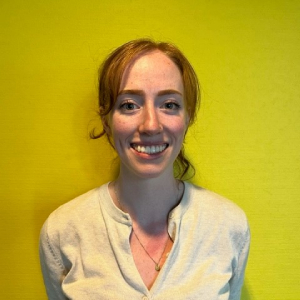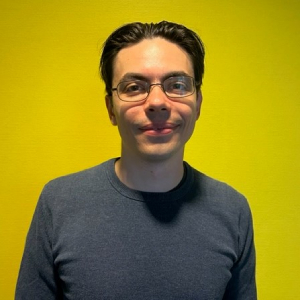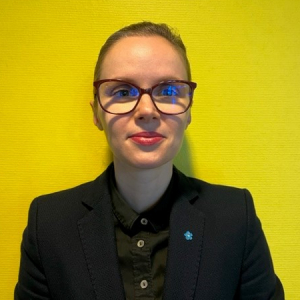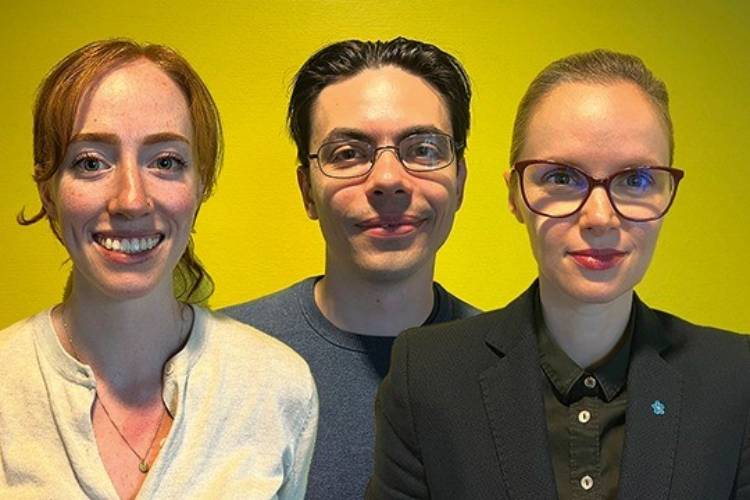
Sarah Roche (28), junior lecturer in Biomedical Sciences
“My manager encouraged me to run as candidate for the works council elections. We’d had some discussions about some issues I had encountered as a junior lecturer, which he said he couldn’t do much about because it was a structural thing, related to how the university is organized. So we thought maybe we could look into that and address the issues from within the works council.
The other members of the works council have been very welcoming, they speak English outside of the meetings, which are in Dutch. We have an interpreter translating everything for the three non-Dutch speaking members. It’s a very good interpreter, but it’s difficult to always translate certain jokes and the tone and dynamics of a conversation, so I feel a little separated from the rest.”
Dutch directness
“I do speak Dutch, I follow the NT2 program for non-Dutch speakers and I’m at B2 level. My partner is Dutch, which also helps, but we speak Dutch with each other only to practice it. I’m from Virginia, I came to Holland as a student in Neuroscience with an Erasmus scholarship. I first studied in Bordeaux for a year and then came to VU, where I finished my master’s.
‘It’s difficult to translate certain jokes and the tone and dynamics of a conversation’
My Dutch is not yet good enough to be able to follow everything that is being said in the works council meetings, that goes too quickly for me. It doesn’t help that most Dutch people are polite enough to switch to English when they hear me speak my faulty Dutch. This is less the case outside Amsterdam, I got to practice my Dutch more during trips to Friesland, Groningen and Overijssel.
I want to stay in the Netherlands. I like the Dutch way of life, riding my bike, I don’t like driving a car much. People sometimes criticize Dutch directness, and I have to admit it took some getting used to the blunt honesty of Dutch people, but it’s very practical and I don’t experience it as insulting or pejorative. In the US, people are afraid to really speak their mind, they want to be on everyone’s good side.”
A waste
“The issues I hope to address in the works council concern the predicament of junior lecturers like myself, who do no research and get a four-year contract, after which they are supposed to be on their way, unless they obtain a PhD. I think this is a waste and detrimental to the quality of education at VU. I’ve been investing in improving the quality of my work, feel that I am better now than I was when I started, so why would you let me go and hire new, inexperienced lecturers. It interrupts continuity at VU.
Another thing is that as a so-called docent 4 – the lowest ranking – I’m supposed to use course material that was already developed by another lecturer. Instead, I have had to redesign my course, design new lectures, work groups, assignments and exams. This is not in my job description at all. I did the work of a docent 1 or 2, and should therefore be promoted, but that’s not possible without a PhD. This is what you get when you assign people more work than they can handle on their own: it falls on people like me, because I’ve heard of many junior lecturers with similar stories.
My contract ends at the beginning of 2025, I will probably have to find something at another university, but I hope to be able to help improve the situation for future junior lecturers.”

Apostolos Tzimoulis (35), assistant professor at the department of Ethics, Governance and Society
“I am from Thessaloniki in the north of Greece. I got my bachelor’s degree in mathematics there, and went to the Netherlands to get my master’s. They offered good programs in English here and I thought one of those, Mathematical Logic, was perfect for me. I did that at the UvA and applied for a position in Delft, where I got my PhD in logical and mathematical frameworks for modelling social behaviour.
At VU I am an assistant professor at the School of Business and Economics, the department of Ethics, Governance and Society. I busy myself with issues like a responsible use of artificial intelligence, which ethical restrictions there are and what we can and cannot do.”
Learning Dutch
“I’ve been in The Netherlands for quite a while, yes, and never learned proper Dutch. The thing is, I didn’t originally plan on staying here in the Netherlands. After I received my PhD, I applied to positions in many places in Europe and around the world. Since then, I have tried to learn Dutch, and I do speak it a little, but I am still at the stage where I translate Dutch sentences in my head, so it would take a lot of effort to give classes in Dutch. I can read basic Dutch, but still have a long way to go.
‘It struck me that many members were senior employees’
My research group is a multidisciplinary group with people from all over the world. English is the main language, so I don’t get a lot of chances to practice Dutch. Also, shortly after I arrived at VU, Covid broke out and we all had to work from home. It took a lot of time to get used to that situation and the first year I didn’t see any of my colleagues in person. Let’s say that didn’t make it easier to make progress with my Dutch either.
I’ve been reading about our government’s plans to limit the number of academic courses in English, and I’m a little worried about what that could mean for me.”
Moving train
“I decided to join the elections for the works council after I received an email encouraging employees to do so. It struck me that many members were senior employees, and that it would do the council good if younger people joined.
I’ve already attended a couple of works council sessions and so far, I’ve found it very interesting. Joining the council is like jumping on a moving train, I still often lack sufficient information about some topics to be able to give good advice – I need to study budget issues more, for instance. But I know what the main issues are about. We’ve had some preparatory training sessions that were very useful and for the international members there are interpreters, we are nicely accommodated.
One issue I would like to address as a works council member is the position of young researchers, especially the internationals. Many of them are overworked and subjected to a lot of stress, without the prospect of a permanent contract in the near future. Instead of a tenure track after they finish their PhD research, they get offered postdoc after postdoc position, which is just discouraging because you will never be able to afford a house and start a family this way. There should be more career certainty.”

Ioana Bratu (37), assistant professor in Space Law
“So far, I think the works council is very dynamic, with everybody sharing their views – some a little louder than others – but the secretary of the works council, Klaske van den Berg, always makes sure everybody is heard. I admire the way she organizes the whole thing, as well as the onboarding process of new members, the information we get, a preliminary training…
Such great onboarding is not always the rule at VU. In discussions with new employees from different faculties and departments, some state they need to discover everything by themselves, which may take unnecessary time.
I’ve been a practicing lawyer in Bucharest, did my MBA at Vienna University for Economics and Business and collaborated with an Austrian law firm, but it had been my career plan all along to pursue a PhD in a cultural environment different from Eastern Europe. I chose the Netherlands because of the topics I wanted to specialize in: governance of artificial intelligence and space law.”
Experienced lawyer
“Before I put myself forward as a candidate for the works council, I was already active in the employee participation at VU, in the ODC, the subcommittee of my faculty. I decided to partake in the works council elections because I think I have added value through my experience in employment law and representing both companies and employees. I was encouraged by the union to join. I’m a member of the Algemene Onderwijsbond [the largest education union in the Netherlands, Ed.], and was very surprised and honored to have sixty people vote for me, a foreigner.
‘Being a foreigner at VU brings both challenges and opportunities’
Being a foreigner at VU brings both challenges and opportunities. The prejudices are a challenge. I notice that for some people it’s very important what is in your passport. Because I’m from Eastern Europe, people think my academic level is lower than theirs, while I’m living proof of the contrary.
The language is also a challenge. I have the impression that people think that some of us refuse to learn the language, but they underestimate how difficult it is to have a job and learn Dutch on the side, which is kind of a second full-time job. What I think is missing at VU is an official procedure to help us learn Dutch, an integrated approach to foreign employees at VU, a clear policy.
And the opportunities of being a foreigner? I think I bring a fresh perspective to the table, being from a different country and having worked in another country. Lately, people have been very vocal against foreigners in the Netherlands, but that’s something to consider.”
Feedback from colleagues
“As a works council member, I aim to focus on HRM issues, particularly the implementation of Recognition & Reward (R&R) at the faculty level through the Art of Engagement. R&R reflects VU’s core values of valuing diverse talents by being open, responsible, and personal, but we need more explicit criteria in order to avoid subjectivity in promotions and development.
Another aspect refers to the evaluation process at VU. We have an annual evaluation with our managers to which we can respond, but there is no official opportunity for mutual peer evaluations. A yearly reflection, via a 360-degree evaluation process, in which we also offer feedback to our colleagues, would foster a more respectful work atmosphere. Currently, it is voluntarily applied, but if we want to improve our culture, it should become mandatory. This would also help managers, often burdened with numerous academic and administrative tasks, to better understand team dynamics.”
